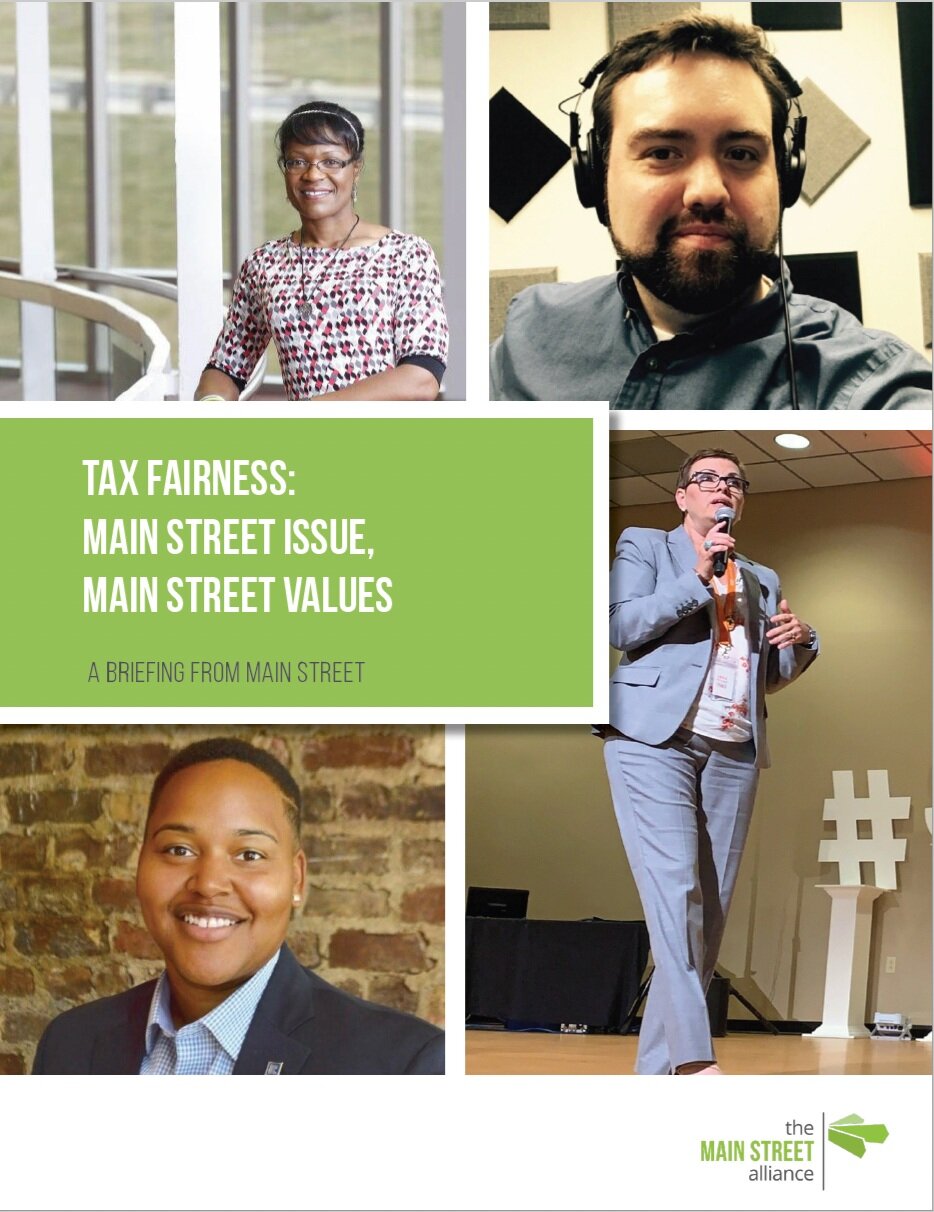Main Street Alliance Releases Tax Fairness Recommendations that would Support Small Businesses as Committees Debate how to Raise Revenue for Build Back Better
MSA Co-Executive Director Stephen Michael will join Invest in America, Small Business Majority, and Small Business for America’s Future to discuss these recommendations and the Ways and Means Committee Tax Plan TODAY (Sept 15) for a Press Call at 11:30 ET (RSVP Here)
Washington, DC - Main Street Alliance today released recommendations for tax reform that would support small businesses and their communities. These recommendations come as the House Ways and Means and Senate Finance Committees are building out their tax plans as part of the investments needed in the Build Back Better package.
The draft plan proposed by the House Ways and Means Committee this week is a major step forward in requiring large corporations to pay their fair share, and a critical means of funding the job-creating investments of the Build Back Better plan. Many of the recommendations are included in this plan. However, there is much farther to go to achieve a truly fair tax system for small businesses than large corporations.
“When a limited set of big corporations and wealthy individuals hoard money and resources, as encouraged by our skewed tax system, small businesses lose,” said Co-Executive Director of Main Street Alliance Stephen Michael (join Stephen for a press call to discuss these recommendations today). “Conversely, improved public sector services like those outlined in the Build Back Better plan and greater customer purchasing power are all investments that can be better funded if the wealthy and large corporations pay their fair share. It’s a win-win-win for small businesses, working families, and their communities.”
The cost of doing nothing is too high. We must seize the opportunity to invest in the economic engine of our country -- small businesses -- and unrig the tax code to make sure a robust recovery has the foundation for the long term.
Small Business Owner Quotes from the Briefing:
“COVID-19 has driven home how essential it is to fund our communities and provide relief to the Black-owned businesses, the Latino-owned businesses, and the mom-and-pops hit hardest by the pandemic. Now, with all of us already pitching in -- small business owners, their employees, people of all races and walks of life -- it’s now time for big corporations to pitch in as well.”
Natasha McKeller Crosby, Natasha Crosby Realty, Richmond, VA
“If we keep pretending that tax breaks are a substitute for true demand, my customers will have less flexibility with their spending, which will lower demand for our services. Tax breaks do not create jobs. Demand creates jobs.”
Ian Levitt, Studio Americana, Minneapolis, MN
“I’ve run a logistics company, a retail shop, and have turned a single popcorn store into a franchise in five states. I’ve learned a lot as a business owner over the years, but across industries, there’s one thing in common: strong consumer demand drives my business decisions and my business growth.”
ReShonda Young, Bank of Jabez, Popcorn Heaven (Founder) Waterloo, IA
“I don’t mind paying taxes. I don’t mind paying my fair share of taxes because I know where it goes. Local schools. Local hospitals. First responders. And more. All critical components to building healthy and strong communities. But if we want to build healthy, strong, and economically thriving communities, well, we’ve got to address the current taxation system.”
Sara McDowell, The Media Squirrel, Charleston, WV
Tax Recommendations Highlights:
Across the country, small business owners of all ethnic backgrounds and in all economic sectors are harmed by rising economic inequality and the unchecked growth in size and power of large corporations. The vast majority of small business owners want a fair federal tax system that sustains Main Street businesses and requires large corporations and the wealthy to make shared contributions to critical public investments.
As lawmakers in Washington, D.C., discuss a series of historic infrastructure investments to support our economy and promote racial equity, they also have an opportunity to take critical steps toward fixing federal tax rules. Main Street Alliance recommends that lawmakers:
Set the corporate tax rate at 28 percent, returning corporate tax revenue to around its 21st Century average before the 2017 tax law.
Return the top tax rate on the richest one percent of Americans to 39.6 percent, where it was before the 2017 tax bill.
Ensure that corporations pay their taxes by improving bank reporting requirements and investing $80 billion over the next decade in the IRS’ enforcement capacity and technology modernization efforts to support audits of large corporations and very wealthy individuals.
Equalize tax rates between the ultra-rich and the rest of Americans by protecting family businesses and ending preferences for capital gains income, giveaways for rich heirs, and other loopholes for the very top.
Discourage offshoring by raising the offshore tax rate for U.S. multinational corporations to an effective 21 percent and eliminating loopholes that incentivize and ultimately reward multinational corporations for shifting profits and jobs overseas.
In addition to these priority measures, Main Street Alliance also recommends the following improvements to our federal tax system:
Prevent U.S. corporations from claiming overseas tax havens as their residence, using foreign mergers and acquisitions to avoid taxes while maintaining management and operations in the U.S.
Replace incentives for offshoring jobs and assets with incentives for onshoring jobs and research and development.
Require large, highly profitable corporations to pay a 15 percent minimum tax on the income they use to report their profits to investors (“book income”).
Eliminate tax preferences for fossil fuels and make polluting industries pay for cleaning up the harm they cause our communities.
Close the carried interest loophole to ensure hedge fund partners pay ordinary income rates on their income.

